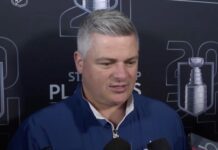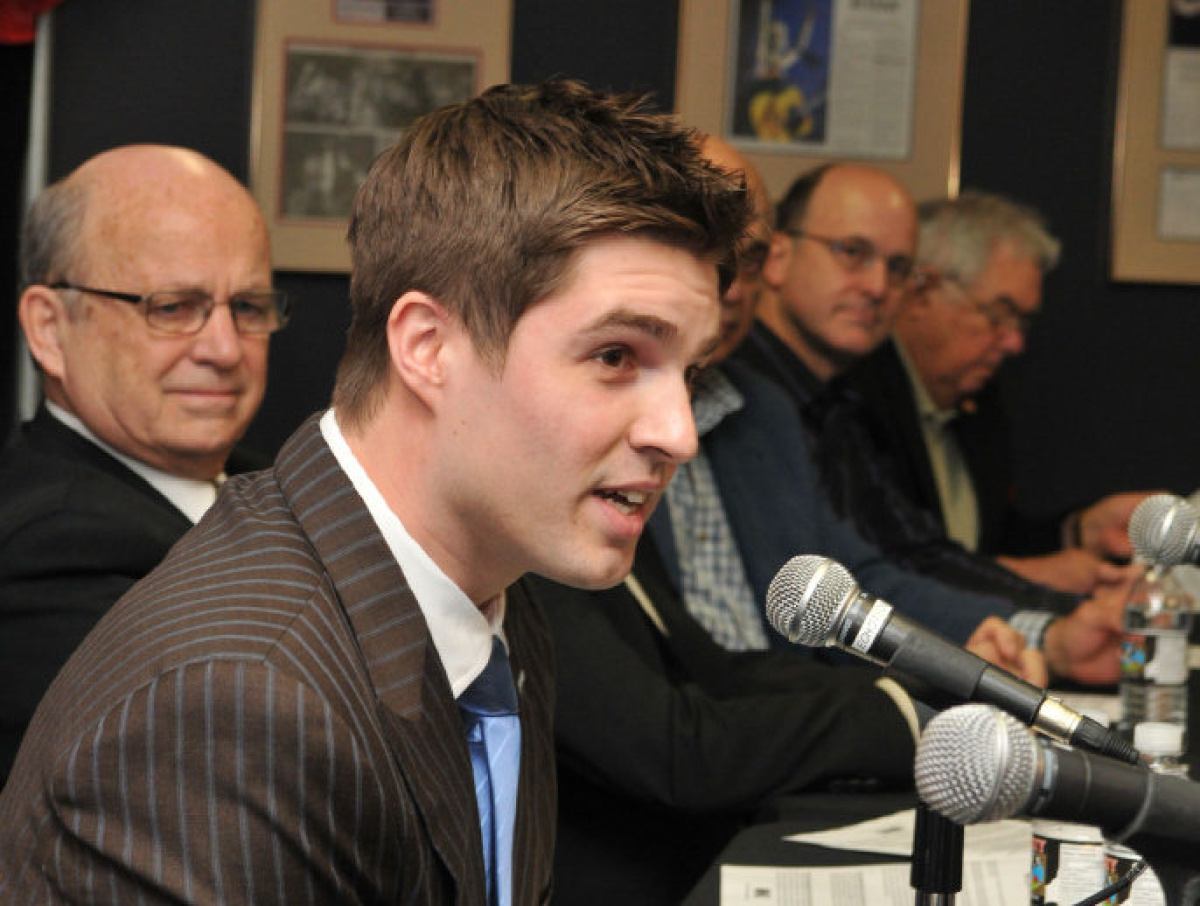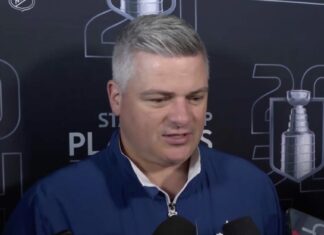Norman James: We know the [Blue Jays’] impact on the city, the province, the country, internationally. What do you think this sort of success from one team can do for potential success for other teams in that same market?
Kyle Dubas: I think it’s tough to quantify and tough to be objective about, but to me, when people are wrapped up and they’re in a real positive mindset with regarding the sports teams in the city, it transfers over between the teams. The Marlies crowd last weekend was boisterous and excited. We were able to win both games. I think the big moment for me would’ve been on Saturday night – the Leaf game against [Ottawa]. The Leafs fans were extraordinarily supportive in getting behind the team even when getting down 3-0. The atmosphere of that game, an early-season game on a Saturday night, it was maybe the best atmosphere I’ve seen at a Maple Leafs game since I’ve been working for the club. The crowd was just outstanding. I think to say that the amount of passion that the Blue Jays have conjured up for sports in Toronto – to say it doesn’t have something to do with that would be foolish. I think everyone is excited about sports here, and how positive everything has been around all the teams. The Leafs and Marlies right now, we have been the benefactors of TFC and the Blue Jays having just excellent seasons. We’ll hope to do our part here once those teams are done for their seasons – hopefully after championships for both.
James: Kyle, you’re a young executive, a young General Manager of the Marlies, assistant GM of the Toronto Maple Leafs. Your time to celebrate will come my friend, but when you see Alex Anthopolous get drenched in champagne, do you try to put yourself in that situation?
Dubas: I think, when you get into sports, in everybody’s case, whether they try to mask it or not, you get in with the ambition that – especially as you climb the different levels, between the OHL with the Soo Greyhounds and now here with the Leafs and Marlies – you’re trying to build a program that can put everybody in that spot, where they’re all celebrating and we’re all celebrating championships on the ice with our fans. Every time you see people that you know, who you know have worked extraordinarily hard and dealt with a tonne of criticism along the way, in Alex’s case and in TFC’s case really with the entire organization for ten years, and you see them get to the point where they’re clinching playoff berths and they’re moving on to league championship series and in TFC’s case they’re second in the Conference now… you see the manifestation of everyone’s hard work that’s gone into it. The amount of criticism they’ve endured, and I think in those cases specifically, the amount of sheer joy the management teams exude when their teams have success, that’s exactly where we want to get with the Marlies and the Leafs. That’s where we wanted to get with Sault Ste. Marie as well, and everyone is working towards that every day.
James: You’re up in the gondola in Ricoh, and you’re corresponding with Sheldon Keefe about the gameplan, do you see Toronto Marlies out there, or do you see future Toronto Maple Leafs?
Dubas: I think the one thing that we’ve really tried to do – I looked at our entire organization as a hockey program, like the way we did with Sault Ste. Marie, and it’s all the Toronto Maple Leafs hockey club, and the Marlies are a massive part of that program, of the Toronto Maple Leafs hockey program. The Marlies are a huge part of that. Player development is a huge part of that. Our sports science department is a huge part of the program. The goal of the program is to maximize the potential of every player every day. In the Marlies’ case, it’s maximizing the potential of the players in helping them become Maple Leafs every single day, and also ensuring they’ve mastered the system that the Maple Leafs are going to play. So when they do go up, they know they’ve reached their absolute peak at the American league level, and that we’ve armed them with all of the information and the education for them to step in with the Maple Leafs right away and make an impact, and save Mike Babcock and his staff the time in having to re-educate the players on their system. It’s trying to streamline that approach and do our part that the prospects in our organization are able to maximize their potential as quickly as they possibly can here in the American league and then transition seamlessly to the NHL, and for us to arm them with everything they need to do that.
James: Just two games in for your Marlies, Kyle. 2-0, but how encouraged are you by this group and what it may be able to accomplish?
Dubas: In the two games, I think in both of them we showed a lot of very good teams, the team has some very exciting players, we had the puck a lot. We outshot our opponents by almost double in the first two periods of both games. And then we showed some areas of much needed improvement. Everyone uses the term, “you have to learn to win;” in our case here, I think it was, in the two games last weekend, the fact that we allowed goals to the other team with their goalie pulled and didn’t close out the wins by continuing to play the way we had earlier in the game. We let some of the proven psychological effects of being up in a game kind of seep in and we got out shot in the third periods, both, and started to play very passive. Now it’s trying to keep the players on the attack for the full 60 minutes. If we can do that, I think we’ll have a lot of success here. Our goal with the Marlies is two fold: 1) it’s to ensure we are doing all that we can on and off the ice to maximize the potential of our players in both areas, as people and athletes, and 2) to make sure they have the Toronto Maple Leafs hockey system mastered so that when they do get called up, they’re able to integrate quickly. We feel that, if we can take care of those two process items, that the scoreboard will take care of itself and we’ll have success.
James: So you’re not only developing players for the Maple Leafs, but you’re acclimatizing them to a system that Mike Babcock will have them play once they go north of the Gardiner.
Dubas: Exactly. Obviously, we know all of the players here have different individual elements of their games that they need to work on, and we’ve got an excellent staff here both in terms of the coaching staff and our development staff led by Scott Pellerin, including Darryl Belfry, Barb Underhill and Mike Ellis, that can help the players on that side of it, and make sure that their individual skills, or the things that they’re lacking, are addressed and taken care of. I think, from the players’ perspective, we want them, when they’re called up, to have the confidence in knowing what Mike is going to expect of them in terms of systems play and position play. The onus is on us here in management and the coaching staff to make sure that the players clearly understand the way the Leafs are going to play, so that when they are called there isn’t that fear that they’re going to be thrown into the deep end and not know what’s going on.
James: The journey to success is a long and arduous one. It’s like taking a road trip to Disney World – you want to go there, but when you’re just going through Tennessee you’re tired and the journey has been long and you wonder what you’ve gotten yourself into it. We know fans get a little ahead of themselves and when they see efforts on the ice that, from their perspective, are anemic or not worthy of the NHL, they seem to get a little antsy and they begin to question what is actually happening… the modus operandi, how this process is taking shape. But inside the walls of the Maple Leafs organization, do you sense any sort of urgency? I know we’re early in this process. And how do you think you’re able to temper any compulsion to want to move this process down the road a little quicker?
Dubas: The only urgency that exists within the organization is the urgency to make sure we’re doing everything that we can every day to get better every day; that we haven’t wasted any days here, that we get up each day and attack every day as it comes, knowing, at the end of it, that our organization is a little bit better than it was the day before. That goes from top to bottom, the players, the management, our sports science department; all the way around. Everybody that is here has had a huge amount of success elsewhere: Brendan Shanahan, as a player and then with the League; Lou Lamoriello, you don’t even have to discuss his success and how much he’s had as a general manager; Mike Babcock, as a coach; Mark Hunter, as a director of player personnel and the amount of success he’s had in London over his career in scouting and evaluation. Everybody here knows what it’s like to build something up and see it become a sustained success, and so there’s al that experience involved and there’s just a steadfast to doing it the right way, not trying to take any shortcuts or patch any holes quickly or look for short-term stimulation over the long-term goals of the club. Do we challenge each other and push each other to be at our absolute best every day? Sure, but nobody in our organization is looking to find any short-term fixes. Everybody is committed to the long-term goal of making this a Stanley Cup contending team year in and year out.
James: Before Lou was hired, you were representing the organization. Not necessarily making trades, but you were out there in the community. Questions were being directed to you. Mark Hunter, we know he ran that draft, and from my perspective that draft is going to prove to be incredible. But there’s a sense that, look, with Brendan Shanahan as the President, and Kyle Dubas and Mark Hunter, and the staff taking shape, things are alright, things are fine. This group together can move forward. And then Lou Lamoriello is hired. There’s a bit of a shock to some people who really want to accelerate the youth movement, not only on the ice but in the board room, and you are sort of the poster child of that. From your perspective, though, were you taken aback by that, or did you view that and accept that as a good thing, a positive thing? We think that you are destined for great things, but maybe you can slow it down a little bit and learn from somebody like Lou.
Dubas: There’s a couple of things. Brendan brought me here, and my trust in him is without question. When he said something is for the best – there’s been times with people I’ve worked with in the past, whether in the Soo or in different areas, if they say something I kind of question it. With Brendan, I never question anything that he’s done. He’s a very bright person, and certainly everything that he does is well thought out. My trust in him is absolutely great. So when he told me the night before Lou was hired that we were going to be bringing Lou in, I looked at it right away and how he explained it to me, from my perspective, it’s a great opportunity to learn from one of the best GMs in the history of the game — certainly, a GM that’s won three Stanley Cups and is in the Hall of Fame. From my perspective, I’m looking to learn and improve myself. To have Lou here every day, and Brendan and Mark and Mike Babcock, it gives me just a great opportunity to do that, selfishly. I’ve really enjoyed that. It’s a very different mix of personalities, which I also really enjoy. I don’t really like organizations where everybody is the same. I like when people are different and have their own unique traits and their own unique way of going about themselves. It gives me a great opportunity to learn. I think, from the organization’s standpoint, that will go on to help the players and help our entire staff; that they have a lot of people who have had different success help them here along the way.





































